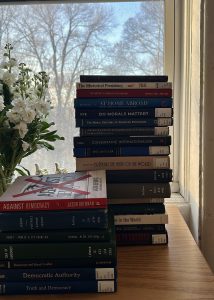
Thesis Books, Photo Credit: Juliet Paiva
I originally wanted to write a blog post on the Core this month, connecting some seminal
idea from a philosopher in Contemporary Civilizations to our day-to-day lives as Columbia students. However, every time I tried to begin writing, I found myself preoccupied with another project perpetually looming over me this semester: my senior thesis. Many other seniors are experiencing the same thing this month as we all attempt to complete the most significant accomplishment of our academic lives so far. As I write this, I am still a month out from when the final draft of my thesis is due. While I expect to have a more expansive perspective on the whole process by then, I wanted to dedicate this post to sharing advice on writing a thesis from the middle of the experience. Hopefully, this advice can also extend to any significant independent research and writing project.
But first, a few disclaimers. I have made my fair share of mistakes throughout the thesis
writing process so far, so my advice takes those into account and focuses on what worked for me. The thesis experience is very individual, and others may have different tips or approaches. My advice focuses on the actual writing process, not the equally important earlier process of defining your research topic or actually conducting the research (check out Elia’s post from October on the Evolution of a Thesis’ Archetype for more on that part). Lastly, each department has a very different senior thesis process. My advice comes from the unique position where I am writing two senior theses in two different departments (Political Science and Philosophy) with drastically different thesis process structures. So, here are a few tips for thesis writing from the (metaphorical) field:
- Start writing! You have to start somewhere. In the extensive research process of writing a senior thesis, it’s easy to feel like you could keep researching endlessly and that each question you have raises three more. One of the most challenging aspects of the thesis process is discipline. In order to maintain a “thesis-sized question,” you have to be disciplined and know when you’re getting too far off-topic. But also remember that just because you started writing does not mean the research must end. Try to break the thesis down into manageable sections or chapters so you can start somewhere and then continuously refine it throughout the writing process.
- Don’t expect constant positive reinforcement (expect criticism…). Don’t let this scare you, but this tip comes straight from the professor who runs the political science honors thesis seminar. As someone who decides to write a thesis, you’re likely a high-achieving student used to receiving positive feedback on your work. Don’t expect that to be the case throughout the thesis writing process. While criticism might be hard to take, it will improve your thesis, and it’s something you should expect from your advisor—that’s their job!
- Make a reverse outline. This is a piece of advice from my philosophy thesis advisor, but I think it applies to writing a longer paper in any field. A reverse outline is a special outline you can create after you have already begun writing something. You take what you have written so far and create an argumentative outline, where you work backwards, and instead of describing the content, you include the motivation for each thing you’ve written. It helps to see if you’re spending too much time on less important points, whether your paragraphs are in a logical order, and whether you properly motivate your argument. I found this especially helpful when I felt stuck during the writing process. It allowed me to reflect on what I wrote until then, see how to reorganize that material more tightly, and project forward to what I still needed to write.
- Curate the thesis writing vibes. This tip could be easily overlooked, but it is just as important as the others. For me, this means setting and music. To get a lot of writing done, I need to be in a library. Choose your favorite Columbia library and make it your thesis writing space. I also like to pick a specific type of music to become the soundtrack for my thesis writing. For me, that meant lo-fi beats for political science and classical music for philosophy, but choose whatever works best for you!
Creating a playlist that you will only listen to when writing willalso help you get in the writing zone whenever you play it. This is not an exhaustive list of tips, but these are a handful of things that helped me so far in the thesis writing process. Good luck!
